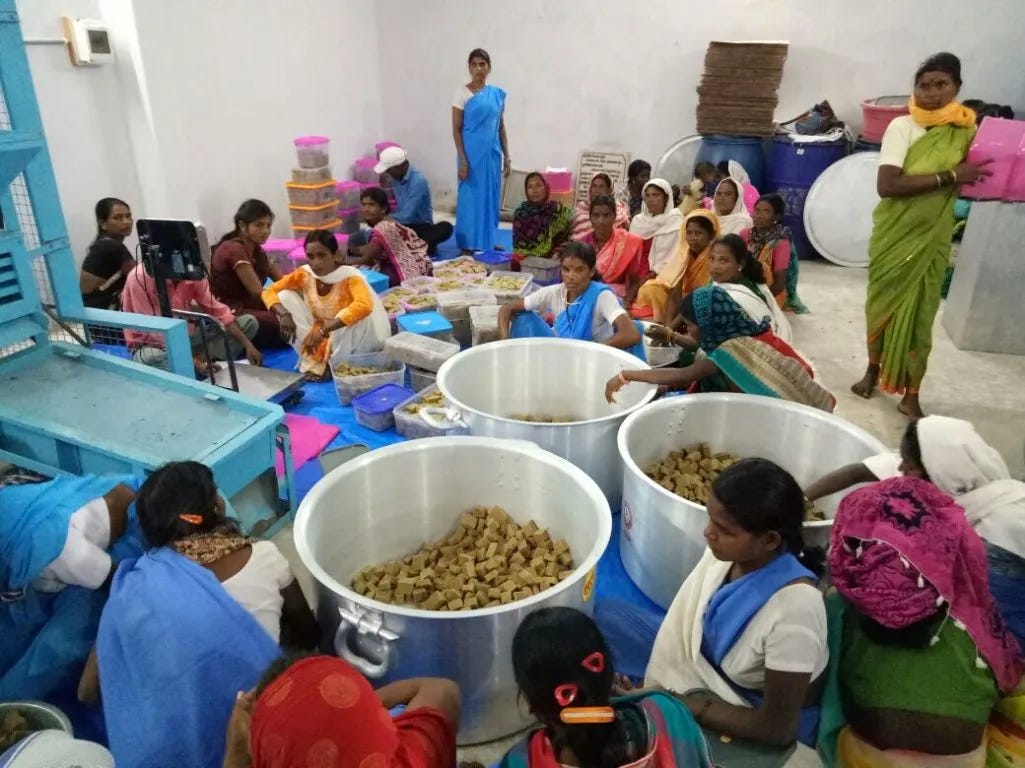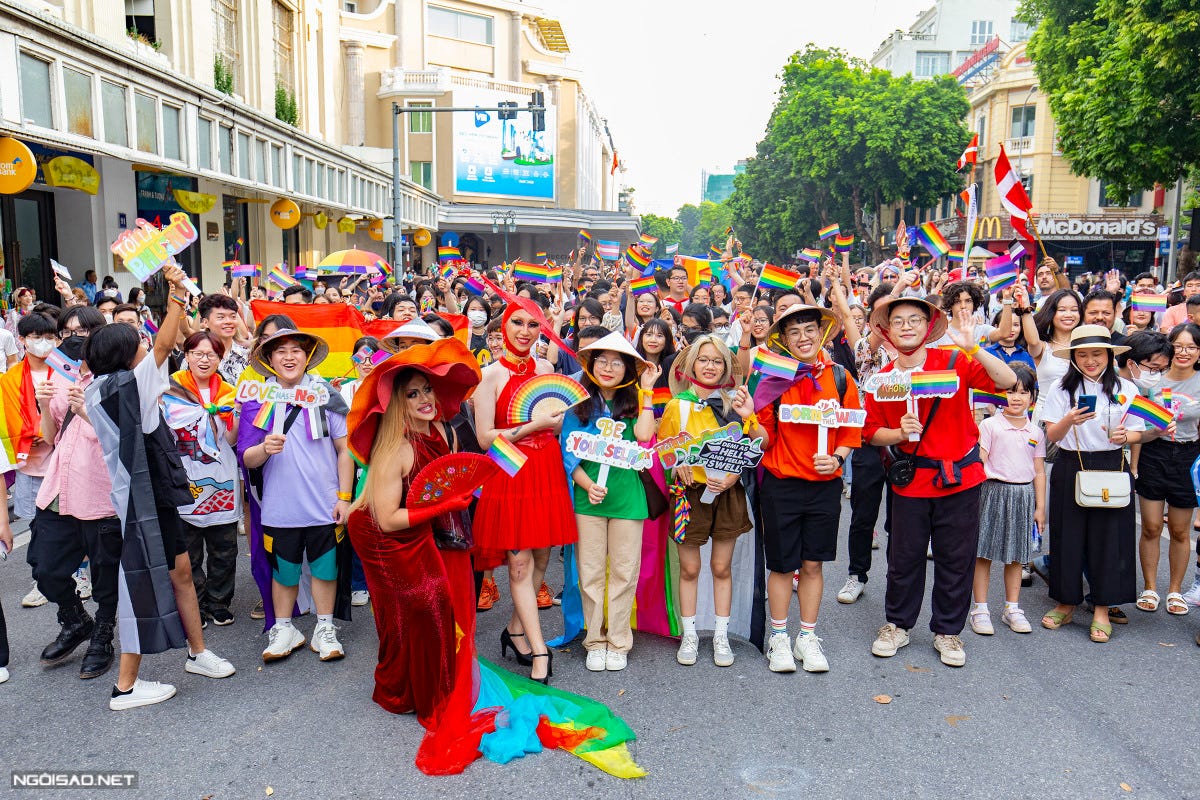Global Roundup: Local Women Farmers in India, Cuba Legalizes Same-Sex Marriage and Adoption, Nigerian and Latin American Apps, Hanoi Pride Returns
Curated by FG Contributor Inaara Merani
Processing plant of federation, Vikas Jha. Photo via Feminism in India.
Women from the Baiga and Gond tribes, living in the Dindori district of Madhya Pradesh in India, are demonstrating how local farming may enhance income and ensure food security in the rural parts of India. Using their local knowledge and skills in conjunction with support and resources from the government, these women have seen success with their farming and business practices.
In 2013, the Madhya Pradesh Government created the Tejaswini Project to empower women farmers and ensure food security. Over 16 thousand tribal women farmers grow Kodo and Kutki, both forms of grain that are turned into biscuits and other food items. The grains are purchased by federations at local purchase centres, and women are immediately paid.
When this project first began, the grains were sold at low rates, women did not know the scientific practices of growing the grains, and most people did not understand the nutritional value of Kodo and Kutki. Keen to continue learning and adapting their practices, Baiga and Gond women formed the backbone of the Self Help Groups (SHGs) that they participated in, which trained women on all the skills and practices needed to farm and harvest Kodo and Kutki. The workshops were conducted in local languages, and women picked up the new practices very quickly which ended up yielding a much higher crop. The productivity of Kodo and Kutki in the Dindori district increased by 25 per cent per hectare from 2015-16 to 2020-2021.
In another area, in the Mehandwani block, after procurement, the grains are made into biscuits and food items that are then supplied to centres in the area. Through the Anganwadi centres in this district, over 38,000 children receive nutritious meals. Additionally, the grains have medicinal properties for individuals living with obesity, diabetes, and/or issues with blood pressure. Food insecurity affects the lives of many children and adolescents in this area and in many areas throughout India.
Through this farming initiative, Baiga and Gond women have strengthened their knowledge and farming practices, and have stimulated positive economic growth and increased incomes within the Dindori district. They are paving the way for a more economically secure future in Madhya Pradesh.
STR/Getty Images. Photo via Them.
On Sunday, Cuba legalized same-sex marriage and same-sex adoption after voters overwhelmingly approved a referendum legalizing both practices. The new legislation will also enhance women’s rights, children’s rights, and elderly rights, promote the equal sharing of domestic labour, legalize surrogate pregnancies, and provide the legal basis for prenuptial agreements.
Activists in Cuba have been successful in pushing the government to adjust the country’s constitution and implement laws that support the LGBTQ+ community. In 2017 activists began rallying to have the language on marriage in the constitution removed, as the original Cuban constitution defined marriage as between a man and a woman. In 2019, marriage was redefined as a “social and legal institution”, but fell short of including language that would legalize same-sex marriage. In 2021, lawmakers began to make moves to update Cuba’s Family Code to legalize same-sex marriage.
Based on feedback from Cuba’s people, the articles of the updated Family Code underwent a series of revisions, and it was finally published in June. The law has faced backlash from various religious and political entities, but advocates still celebrated the passing of this landmark legislation.
The most emancipatory, fair and beautiful law in the world, which regulates family law, has been ratified. Now, love is law on the island of freedom. – Mariela Castro, director of the National Center for Sex Education
Members of HerRyde, a ride-hailing app with exclusively women drivers, pose in front of a car outside HerRyde office, in Abuja, Nigeria September 4, 2022. Photo via REUTERS/Afolabi Sotunde.
HerRyde is a women-only ride-hailing app that was launched in Nigeria in August. The company exclusively employs women drivers to ensure that other women feel comfortable as they take rides alone.
The company launched with 10 drivers and it logged around 500 rides in its first month in Abuja. The founders of the app intend to expand the service in Nigeria outside of the capital city.
We get discriminated on a lot. Like when you have a request that is from a male client, the male tends to cancel the ride because they don’t want to ride with you being a female. – Adetutu Patricia Oni, driver for HerRyde
There are a number of stories in the local media of sexual assault, robbery, and harassment that women passengers encounter while using ride-hailing apps. Co-founder Monsurah Alli-Oluwafuyi stated that these stories were the reason behind the company’s launch. HerRyde’s goal is to create a safe method of transportation for women in Nigeria and to also expand employment opportunities for women drivers.
We don't want cases where women have to be on their toes or on the edge when they are using ride-hailing services – Monsurah Alli-Oluwafuyi, co-founder of HerRyde
Ana Sofia Pablo, Nancy Rojas and Diana Enriquez, members of nonprofit CACEH, show the app Dignas on their phones at their office in Mexico City, August 19, 2022. Photo via Thomson Reuters Foundation/Diana Baptista.
In recent years, worker-led collectives have developed numerous apps in Latin America to support over nine million domestic workers defend their labour rights. The majority of the individuals that benefit from these apps are poor, Black, Indigenous, and migrant women.
It's a type of work that has its origins in slavery. (These women) are at the epicenter of prejudices of sex, race and class. – Márcia Soares, executive director at Themis
The Brazilian app Laudelina was launched in 2018 by the nonprofit Themis in partnership with the National Federation of Domestic Workers in Brazil. It provides a number of tools for Brazilian domestic workers including an interactive guide to their rights, a calculator of benefits, a list of protection agencies, and a networking tool to meet other domestic workers. Laudelina inspired the creation of apps in Mexico and Colombia.
In Mexico, the app Dignas provides domestic workers with information on their labour rights, as well as a calculator to estimate payments and bonuses that are due. Dignas was created by CACEH, a collective of domestic workers, during the pandemic in which there were hundreds of cases of domestic workers being locked up in their employers' homes or fired from their long-term positions. The Aliadas app was created in Colombia to provide up-to-date information on labour rights, as well as audio options for women who cannot read.
The information and resources provided on the apps Laudelina, Dignas, and The Aliadas have supported numerous domestic women workers in Latin America as they navigate difficult situations with their employment and finances.
The pandemic taught us about the need to innovate to mitigate the crisis domestic workers were living through. – Ana Sofía Pablo, project manager at CACEH
Despite the success of these apps in supporting domestic women workers throughout Mexico, Brazil, and Colombia, the apps remain inaccessible to numerous women who have limited access to cellphones and the internet, and to those who have low digital literacy in remote areas. As such, the nonprofits behind the apps have plans to host events to promote digital literacy and to push employers into respecting labour rights
In paper we have advanced a lot in terms of access to rights. But we still lack a cultural change in which employers see us as worthy of those rights. – Ana Sofía Pablo
The main event, the "rainbow parade," began at 4:30 p.m. when hundreds of locals, foreigners living in Hanoi and tourists paraded around Hoan Kiem Lake. Photo via VN Express
Last week, the city of Hanoi celebrated Pride Week for the first time since 2019. For the last two years, Pride celebrations were cancelled due to the COVID-19 pandemic.
From September 19 to 25, thousands of people participated in Pride celebrations such as workshops, screenings, and festivals. At the beginning of the week, ambassadors from Canada, New Zealand, Norway, and Switzerland met with LGBTQ+ activists and advocates to discuss their wishes for the LGBTQ+ community in Hanoi. On the last day, the capital city of Vietnam hosted its Pride parade.
I'm excited because this is my first time in the Pride parade. Through the parade, I hope to spread a positive message, promote self-confidence and encourage others to be true to themselves. I've noticed that society's attitude toward the LGBTIQ+ community has shifted in recent years. People are becoming more aware of gender diversity and different sexual orientations, as well as other genders. – Nguyen Chi Khang via VN Express International
On August 8, the Ministry of Health said since homosexuality is not a disease and thus cannot and should not be "cured," medical examination and treatment facilities must be respectful of all gender identities and provide equal healthcare access opportunities. Photo via VN Express.
In August, the Ministry of Health in Vietnam made an announcement stating that being queer is not an illness, and therefore the LGBTQ+ community cannot, and is not in, need of curing. LGBTQ+ rights have come a long way in Vietnam; the local LGBTQ+ rights group, ICS Center, recently launched the Toi Dong Y (I do) 2022 campaign in Ho Chi Minh City earlier this year. The ICS Center is keen on pushing for the legalization of same-sex relationships, an endeavour that has not been attempted in almost a decade.
This was a special day for the LGBTQ+ community in Hanoi, after being unable to celebrate for two years formally. The struggle for full and equal rights continues and the LGBTQ+ community in Hanoi, and across Vietnam, are demonstrating their resilience and dedication to the cause.
Inaara Merani (she/her) recently completed her Masters degree at the University of Western Ontario, studying Gender, Sexuality, and Women’s Studies with a specialization in Transitional Justice. In the upcoming years, she hopes to attend law school, focusing her career in human rights law.
Inaara is deeply passionate about dismantling patriarchal institutions to ensure women and other marginalized populations have safe and equal access to their rights. She believes in the power of knowledge and learning from others, and hopes to continue to learn from others throughout her career.







